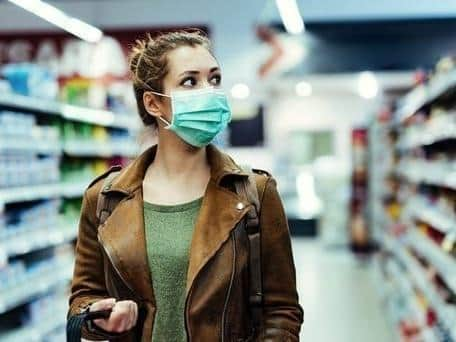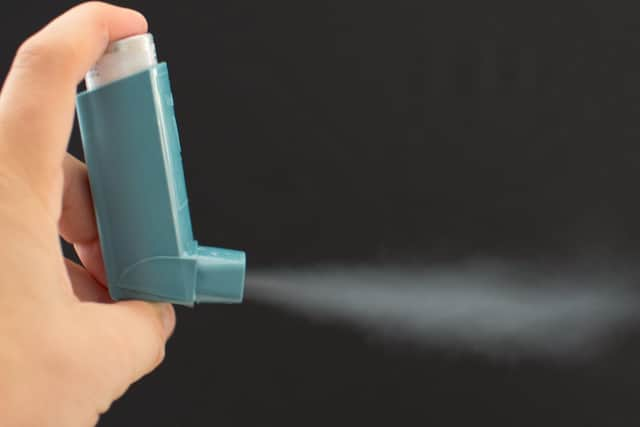Face masks, abuse and exemptions: how do Lancashire shops 'police' who is flouting the rules?
and live on Freeview channel 276
Step into any high street store, shopping centre or bus, and you'll be met with a sea of eyes.
Face coverings became compulsory in shops in England in July, and on public transport in June, meaning most of us have to don a mask as part of our everyday routines, to help control the spread of coronavirus.
Advertisement
Hide AdAdvertisement
Hide AdBut what about those who are exempt from the regulations - mainly children under 11 and people with certain health conditions?


The law states it is not compulsory for people to carry an exemption card or lanyard to show their status - leaving a grey area where it is tricky to 'police' who is flouting the rules and who has a genuine reason not to cover up.
One Bamber Bridge woman who is exempt for medical reasons told the Post she has faced abuse for not wearing a mask in public - and was even chastised in a hospital environment.
The mum-of-two said: "Masks make my conditions 100 times worse. I'd start hyperventilating and could have an allergic reaction. They could make me pass out, and my heart rate could become so high that I could have a heart attack.
Advertisement
Hide AdAdvertisement
Hide Ad"It's scary. I've only been out four times [since the pandemic began] because of nerves and people's attitudes. It's horrible.


"I feel very lonely, like I'm on the outside of humanity, looking in. If you go out and you're not wearing a mask, people mutter and say you are selfish.
"Not everybody without a mask is some weird conspiracy nutter.
"We are turning into a nasty community that finger-points. It's a scary road we're going down. People are very angry with each other, and I'm terrified for myself and my children. It's going to make us ill."
Advertisement
Hide AdAdvertisement
Hide AdThe mum, who uses a wheelchair, fears having a heart attack while wearing a mask because of fainting and breathing problems caused by dysautonomia and Postural Tachycardia Syndrome (PoTS). She also suffers from a series of conditions including dystonia, fibromyalgia, Ehlers-Danlos syndrome (EDS) and chronic idiopathic oedema urticaria.
People with PoTS cannot adjust to gravity due to an abnormal response by the autonomic nervous system (ANS). They can experience palpitations, light-headedness, fatigue, sweating, nausea, fainting and headaches because of a persistent increase in heart rate when moving from the lying to upright position.
The mum claims she could become so hot while wearing a mask that she could easily pass out, as her body cannot regulate its temperature properly, while breathing difficulties and stressful situations can cause flare-ups.
Despite her health issues, the 45-year-old says she was verbally abused by Chorley Hospital staff for refusing to cover her face while accompanying her youngest daughter, who is in remission from cancer and has asthma, severe anxiety and Ehlers-Danlos syndrome, to a blood test.
Advertisement
Hide AdAdvertisement
Hide AdShe says a nurse also asked her to leave if she would not prove her exemption. This is despite the law stating that people who cannot cover their face for an age, health or disability reason do not have to provide written evidence, and should not be routinely asked for it. And they do not need to seek advice or request a letter from a medical professional.
"It was shocking and embarrassing. A stranger shouting at you is traumatic," she said.
"My child was very anxious about the blood tests and was already quite frightened and distressed.
"The nurse made me feel about two centimetres tall. She should know the rules about not asking for proof. We should be treated the same as somebody in a mask.
Advertisement
Hide AdAdvertisement
Hide Ad"It's obvious I'm struggling because my head is held up by a neck brace and I have spasms, like when you see a person with Parkinson's shake."
Sarah Cullen, director of nursing, midwifery and AHPs at Lancashire Teaching Hospitals NHS Foundation Trust, told the Post: “It is absolutely inappropriate that a patient or visitor to our hospitals be treated with anything other than absolute respect. We are sorry to hear that this has been this family’s experience and will take this incident seriously, ensuring this does not happen again.
“We would encourage anyone who has had a negative experience to report it to our Patient Advice and Liaison Service (PALS) [on 0759 198 8962 or [email protected]].
“The requirement to wear a mask for staff and patients in our organisation is an important safety precaution put in place to protect everyone who enters our hospitals, but at the same time, just because someone isn’t wearing a mask and doesn’t have a visible medical condition, no-one should make the assumption that they don’t have a valid reason not to be wearing one.”
Advertisement
Hide AdAdvertisement
Hide AdSo what about shop staff and those in similar roles, who have the task of dealing with customers who may enter a store without wearing a covering?
Several supermarkets, like Booths and Morrisons, have adopted the new Hidden Disabilities Sunflower Lanyard Scheme to help make life easier for vulnerable customers. People with invisible conditions like autism, dementia and visual or hearing impairments can wear a free lanyard that discreetly signals their exemption to staff without being prompted.
A Booths spokesman says the retailer introduced the initiative in late July and that customers tend to comply with their policies.
Likewise, Dave Paris, manager of Morrisons in Bamber Bridge, says his store does not ask people for proof of exemption.
Advertisement
Hide AdAdvertisement
Hide AdHe added: "We take them at their word. We're very aware people might have a reason why they can't wear a mask and don't want to keep discussing it. I'm exempt as I have asthma but I wear one because it doesn't impact me.
"I'm genuinely really pleased with how customers have taken to the policies. I've only had one situation where a customer was asked to cover their face and they said, 'Let them fine me; I'll take my chances.'"
Instead, the store is relying on other measures to combat the virus, such as head-counting customers, cutting service time to avoid queues outside and asking staff in close contact with shoppers to wear masks if they do not work behind screens.
This resonates with the disabled woman we spoke with, who believes other tactics need more enforcement in public spaces, such as the two-metre rule.
Advertisement
Hide AdAdvertisement
Hide AdThat is because many mask wearers, she adds, are abusing vulnerable people without properly following safety rules themselves. Her eldest daughter, for example, suffers from anxiety, asthma, PoTS and Ehlers-Danlos syndrome. Her mum claims she has received so much hate that she still wears a mask in public - and risks having an asthma attack.
"She puts it on her mouth but not her nose and no-one questions that," she said.
"A lot of mask-wearers do that. And how many people are washing them after 20 minutes like they're supposed to?"
For more information about the Sunflower Landyard Scheme visit https://hiddendisabilitiesstore.com/
Where must you wear a face covering in England?
- Public transport;
- Transport hubs (e.g. airports or bus stations);
- Shops and supermarkets;
- Shopping centres (e.g. indoor markets);
- Auction houses;
Advertisement
Hide AdAdvertisement
Hide Ad- Premises providing professional, legal or financial services (e.g. Post Offices, banks or high-street solicitors);
- Premises providing personal care and beauty treatments (e.g. hair salons);
- Veterinary surgeries;
- Visitor attractions and entertainment venues (e.g. cinemas or bowling alleys);
- Libraries;
- Places of worship;
- Funeral service providers;
- Community centres, youth centres and social clubs;
- Exhibition halls and conference centres;
- Public areas in hotels and hostels;
- Storage and distribution facilities.
Who is exempt?
- Children aged under 11.
- Someone who cannot wear a face covering because of a physical or mental illness or disability;
Advertisement
Hide AdAdvertisement
Hide Ad- Someone for whom wearing or removing one would cause severe distress;
- Someone assisting a person who relies on lip-reading to communicate.
You can also remove your face covering when asked:
- By shop staff for the purpose of age identification;
- If speaking with people who rely on lip-reading, facial expressions and clear sound.
Comment Guidelines
National World encourages reader discussion on our stories. User feedback, insights and back-and-forth exchanges add a rich layer of context to reporting. Please review our Community Guidelines before commenting.